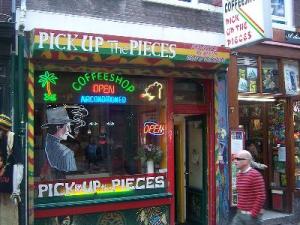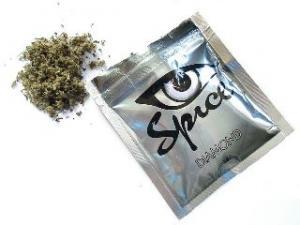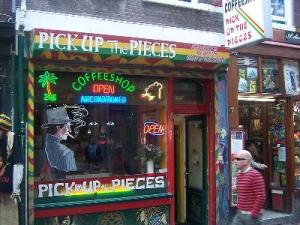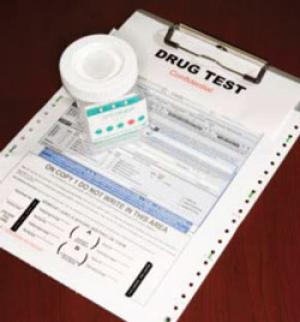The Dutch government implemented its "weed pass" plan barring foreigners from buying marijuana at its cannabis coffee shops in three southern provinces Tuesday, but the coffee shops are not giving in without a fight.
Florida Gov. Rick Scott campaign to force drug tests on state workers got slapped down by a federal judge Wednesday, on fourth amendment grounds.
President Obama is taking flak from comedians and politicians alike over the federal crackdown on dispensaries. Meanwhile, raids and legal battles continue to rage across the country.
ProCon.org is a set of in-depth web sites presenting information and views from on current issues, several with relevance to drug policy. The Chronicle is currently running a series of info items from ProCon.org -- this one from dare.procon.org -- and we encourage you to check it out.
Former New Mexico Republican Gov. Gary Johnson has selected Judge Jim Gray as his vice presidential nod in his Libertarian Party presidential nominee campaign. That's a pretty strong anti-prohibitionist ticket.
Police in Chesapeake, Virginia, are claiming they can smell marijuana in a passing vehicle while they are in their moving cruisers with the windows rolled up. So far, they're getting away with it.
Eight British Columbia mayors, including the mayor Vancouver, have signed a letter calling for marijuana legalization, taxation, and regulation. They are only the latest in a growing chorus of BC public figures ready to free the weed.
No more legal fake weed in Australia. It's been scheduled as a controlled substance and its possession, sale, or manufacture is now a criminal offense.
A Dutch court has upheld a looming ban on foreigners in southern border province cannabis cafes, but coffee shop owners are appealing to the European Court of Human Rights. The battle over the ban, set to go nationwide next year, is far from over.
An Oregon man facing meth charges was shot and killed by police last Saturday after he fled from them in his pick-up, then rammed their patrol car.
A South Carolina man was arrested for selling cocaine to undercover officers, then died in the police car. The suggestion is that he may have swallowed drugs, causing an overdose, but we have to wait on the toxicology report for that.
A pot-growing prosecutor, a heroin-filled burrito-smuggling deputy, and a cop who made a habit of ripping off drug dealers at a night club all made the news this week.
Events and quotes of note from this week's drug policy events of years past.
A Dutch government policy aimed at barring foreign tourists from buying marijuana in the Netherlands went into effect in three southern border provinces Tuesday, but it didn't go exactly as authorities planned.

Amsterdam cannabis "coffee shop" (wikimedia.org)
In the southern border city of
Maastricht, hundreds of demonstrators filled a central square to protest the move, waving signs saying "Away with the Weed Pass," "No Discrimination Against Belgians," and "Dealers Wanted!" and toting a six-foot long joint. Meanwhile, cannabis coffee shop owners across the city closed their doors to protest the imposition of the scheme, leaving the city's mayor ruffled and pot-buyers to seek out street dealers.
The weed pass plan is the brainchild of the rightist Liberal-Christian Democrat coalition government, which collapsed last month. But the Dutch parliament had already approved the plan, and it is still scheduled to go into effect nationwide beginning January 1.
Under the weed pass plan, cannabis coffee shops will be forced to become "members only" clubs, with membership limited to 2,000 people per club. Members must register their identities, and only Dutch citizens and residents will be allowed to join the clubs.
Marijuana remains illegal in the Netherlands, but under a policy of pragmatic tolerance in effect since 1976, the Dutch government has allowed for the sale of small amounts of marijuana through the coffee shops. The current lame duck government of Prime Minister Mark
Rutte, playing to its conservative base, has moved against the coffee shops as part of a broader anti-drug campaign that has also seen it label hashish a "hard drug" and move to criminalize
khat, which is used almost exclusively by the country's small Somali immigrant population.
The weed pass plan is now in effect in the provinces of
Brabant,
Limburg, and
Zeeland, which border Belgium and/or Germany.
Reuters reported that most coffee shops in cities such as
Eindhoven,
Roermond, and
Tilburg were also shut, or were ignoring the weed pass.
"We've been selling cannabis to anybody who comes, as normal," said William
Vugs, owner of the 't
Oermelijn coffee shop in
Tilburg. "We are being forced to discriminate against foreigners. They don't just spend their money here, they buy groceries and fill up their cars, too," he said.
Vugs said his shop served 800 customers a day, about one-fifth of them from Belgium. Turning them away would have economic consequences beyond the coffee shops, he said.
Vugs is one of the coffee shop owners who hopes to block the weed pass in court by arguing that it is discriminatory. That's the plan concocted by the
Maastricht Coffee Shop Union (
VOCM), which announced in a press release Monday that it would challenge the law in court.
"Too much is still unclear about the privacy concerns, but also on the exact requirements of the minister, said
VOCM leader Marc
Josemans, owner of the Easy Going coffee shop in
Maastricht. "Therefore we will not register customers and will continue to sell to anyone aged 18 and older who can identify himself. "
Instead, in a surprise move, the city's coffee shops closed their doors -- except for Easy Going.
Josemans opened long enough to refuse to sell pot to a group of foreigners, who then proceeded to a local police station to file a discrimination complaint. Such complaints will be the basis of the looming legal challenge to the weed pass.
Josemans then stayed open, selling marijuana to anyone who asked for it, and local police arrived shortly.
"The police paid me a visit about a half an hour later and warned me I was violating the new rules, and if I do it again, I'll be closed down for a month," he said in a telephone interview with the
Associated Press. But he added that he planned to continue selling to all comers and that he expected his shop to be shut down. He would then take his case to the European Court of Justice, he said. "Discrimination is never the right answer,"
Joseman said.
Previous efforts to overturn the law, both in the Dutch courts and the European Court of Justice, have failed, but the coffee shop owners and their supporters are determined to try again.
Tuesday also saw competing press conferences in
Maastricht, with the mayor and city officials at one and coffee shop supporters at the other, held in front of Easy Going.
Maastricht Mayor
Onno Hoes said the city supported the weed pass plan and that the coffee shop owners were "rude" to close their doors. "I did not think the owners would be so cheeky," he complained. "By doing this, they are hurting the local population."
But not the street drug dealers, who, according to the
VOCM, are flocking to the city to take advantage of the ban on sales to foreigners.
"
Maastricht is now faced with drug runners who have never been spotted in the city before, coming from Liege, eastern Europe and northern France," the group said. "They are using flyers explaining the new rules that were issued by the city of
Maastricht in order to lure tourists! Thus we are rapidly returning to a long gone past where a separation of markets for cannabis and hard drugs did not exist and dealers controlled the streets."
Former head of the Netherlands Police Union Hans van
Duijn echoed that sentiment at the press conference in front of Easy Going. "Everyone who is rejected here will walk a few meters down the street to the drug dealers who drive over from Rotterdam, among other places, and ride around in large numbers," he said.
The primary reasons the Dutch adopted the pragmatic tolerance policy allowing for the coffee shops were to separate "soft" and "hard" drug markets and to reduce the number of street dealers. But it appears the weed pass policy will have the opposite effect.
"This weed pass is a bizarre U-turn by a government of moralistic politicians looking for ways to score points among the conservative part of the nation," said
Joep Oomen, director of the
European Coalition for Just and Effective Drug Policies (
ENCOD) from his home next door in Belgium. "It is a slap in the face of the millions of non-Dutch residents who visit the coffee shops every year without ever causing any nuisance, as well as of Dutch society as a whole, that will now be faced with an increasing illegal cannabis circuit."
Oomen noted that street dealers in
Maastricht Tuesday were openly defying authorities by giving interviews on Dutch TV.
"Nobody expects that people looking for good quality cannabis will now cease to do that," he continued. "They will just not be allowed in the coffee shops anymore and will instead find their stuff on the streets."
For
ENCOD, the weed pass plan is a repressive last gasp that could have unintended consequences, good as well as bad.
"We consider this as a last convulsion of a dying body,"
Oomen said. "The problems that this effort to end the coffee shop model will create will cause the Dutch public to see that the only real solution is to regulate the 'back door' of the coffee shops."
Oomen was referring to the peculiarity in the current Dutch system which allows for marijuana to be sold, but does not allow for a legal supply for the coffee shops. That has resulted in increasing black market pot production.
The issue of the "back door" was also on
Joseman's mind.
"Let's forget this right wing hobby and focus on the real problem -- the 'back door,'" he said. "This is the Achilles heel of Dutch cannabis policy. When we finally start to regulate the cultivation of cannabis and supply to the coffee shops, we will kill three birds with one stone: significantly less crime, huge profits for public health, and one billion
euros a year extra in the national treasury."
But first, the coffee shops have to deal with their current "front door" problem. The looming court cases are one avenue, but the September elections set to replace the current government provide another one.
"Our hope is on the outcome of the trial processes that have started today in Maastricht and
Tilburg by the closure of the coffee shops that refuse to carry out the new measure, and on the general elections in September," said
Oomen. "Predictions are that at least two of the five left-wing parties that are currently in opposition will participate in the next government, and they will cancel the new measures or at least diminish their impact."
back to top
A federal district court judge in Miami has thrown out Florida Gov. Rick Scott's (R) executive order requiring state employees to submit to suspicionless drug tests. The order violates the Fourth Amendment's proscription against unreasonable searches and seizures, the judge ruled.
Gov. Scott, a former health care executive, issued the order calling for random drug testing of all state employees in March 2011, but stayed it in the face of a legal challenge from the
ACLU of Florida and the Association of Federal, State, County, and Municipal Employees (
AFSCME), the union representing thousands of state workers.
Scott argued that requiring drug tests was akin to statutory requirements that some state workers make financial disclosures, but US District Court Judge Ursula
Ungaro wasn't buying it.
In her
ruling last Wednesday,
Ungaro called Scott's reasoning "hardly transparent and frankly obscure" and said it did not justify violating the Fourth Amendment. "He offers no plausible rationale explaining why the fact that a state employee's work product and financial status are publicly accessible leads to the conclusions that the employee's expectation of privacy in his or her bodily functions and fluids are then diminished,"
Ungaro wrote.
"The governor can't order the state to search people's bodily fluids for no reason -- the Constitution prohibits that sort of government intrusion," said Howard Simon, executive director of the ACLU of Florida. "And the governor can't demand that people surrender their constitutional rights for the privilege of working for the state or receiving some other government benefit."
"Today's ruling is important because it reinforces the bright line which government may not cross," said ACLU cooperating attorney Peter Walsh. "If the state is going to require a drug test as a condition of keeping your job, it needs to have a reason, and simply being against drugs isn't enough."
In a statement last Thursday, Scott said he would appeal, but gave no acknowledgment of the constitutional issues involved.
"As I have repeatedly explained, I believe that drug testing state employees is a common sense means of ensuring a safe, efficient and productive workforce," he said."That is why so many private employers drug-test, and why the public and Florida's taxpayers overwhelmingly support this policy. I respectfully disagree with the court's ruling and will pursue the case on appeal."
Scott is not doing well with his drug testing campaign. A law he backed requiring drug tests for people seeking welfare has been temporarily blocked by a federal district court judge in Orlando, who has indicated she will likely find that measure also unconstitutional.
back to top
President Obama is taking flak from comedians and politicians alike over the federal crackdown on dispensaries. Meanwhile, raids and legal battles continue to rage across the country. Let's get to it:
National
Last Thursday,
Rep. Barney Frank criticized President Obama for the medical marijuana crackdown. "I think it's bad politics and bad policy," Frank said. "I'm very disappointed. I think it's a grave mistake. It's unfair and will hurt innocent people," he told The Hill. Frank said he has told Obama personally that he is "making a mistake on this," though he doubts medical marijuana will be an issue for the president in the 2012 campaign. "Not against Mitt Romney," Frank said.
On Saturday,
comedian Jimmy Kimmel confronted President Obama over the federal medical marijuana crackdown as he hosted the annual White House Correspondents' Dinner. "I do have one real question for you, Mr. President. What's with the marijuana crackdown? I mean, seriously, what's the concern, we will deplete the nation's
Funyun supply?" he quipped. "You know, pot smokers vote, too -- sometimes a week after the election, but they vote." Go to the link above for Kimmel's complete marijuana segment.
California
The California legislature will vote on several bills that will seriously affect medical cannabis patients in the state, so patient lobby group
Americans for Safe Access is leading a rare three days of outreach in Sacramento May 19-21. It's called the
California Unity Conference and medical cannabis lobby day. "The conference is organized by Californians to Regulate Medical Marijuana, a statewide coalition of individuals and organizations dedicated to pushing back on federal pressure on medical cannabis in California. We are planning two days of strategy and skills-building. Then on Monday, May 21, we will be going to the Capitol en masse to support good legislation and stop bad bills. Conference attendees will visit all 120 legislative offices that day. This is an important element in our state campaign this year, and your participation is crucial. Register online today."
Last Tuesday,
the Garden Grove police chief called on the feds to raid dispensaries in his town. Chief Kevin
Raney told the City Council Tuesday night his department has been in touch with federal agents and "they will be coming to Garden Grove in the future." The chief's comments came in response to complaints about the dispensaries from some council members and neighborhood associations. Councilman Bruce
Broadwater called the growing number of dispensaries "a nightmare." There are an estimated 60 dispensaries in the city of 35,000.
Also last Tuesday,
a Union City dispensary was ordered shut down after a battle with the city. CHA Wellness Center will have to close by the end of this week. It had opened in January after its owner won a permit to provide "holistic health care and relaxed products and services" and "packaged products for retail exchange." The city had told CHA it couldn't distribute medical marijuana and quickly issued a ban on operations and filed a civil complaint in Alameda County Superior Court when it found out it actually was a dispensary. The city council revoked its business license last Tuesday.
Also last Tuesday,
Trinity County approved most of the cultivation standards drafted by the County Planning Commission and directed that the draft ordinance be prepared for final adoption as soon as possible. That will require at least two more public hearings. The proposed rules only apply to cultivation for personal use in a residential setting, establishing plant count limits or garden size based on the size of a parcel of land. Once adopted, they will replace temporary limits currently in place under an emergency moratorium with slightly more stringent requirements including one that all cultivation be conducted indoors on parcels of one acre or less. Proposed aggregate grow standards addressing large-scale marijuana operations have been sent back for additional work by the commission.
Also last Tuesday,
Nevada County ordered staff to come up with an interim emergency and other cultivation ordinance for a hearing on May 8. The ordinance being proposed bars indoor home grows and allows them only in detached structures on properties where a patient or primary caregiver lives. Rural or residential properties under two acres could grow up to 75 square feet outdoors and no more than six plants indoors, no matter how many patients are involved. The proposed ordinance also includes other requirements.
Last Thursday,
the San Francisco Democratic Party called on President Obama to end the federal crackdown. The party Central Committee passed a resolution demanding that President Obama, Attorney General Eric Holder, and US Attorney Melinda Haag "cease all Federal actions in San Francisco immediately, respect State and local laws, and stop the closure of City-permitted medical cannabis facilities." It was cosponsored by 21
DCCC members including its author, Gabriel
Haaland, Assembly member Tom
Ammiano, State Senator Leland Yee, Supervisor David Campos, Supervisor David
Chiu, former State Senator Carole
Migden, and former Supervisor Aaron
Peskin.
On Monday,
the Berkeley Patients Group closed its doors. The venerable and well-respected dispensary fell victim to the ongoing federal crackdown. Last fall, US Attorney Melinda Haag threatened to seize the property, and its landlords served it with an eviction notice effective Tuesday. The
BPG was seen as a model dispensary, employed dozens of people, and served thousands of patients. Its closure is a major blow to the state's medical marijuana industry.
On Tuesday,
the city of Rancho Mirage appealed a court ruling that overturned its ban on dispensaries. The city hopes to "freeze" the case with the appeal, which seeks a stay, so it can reject a new dispensary that recently filed an application. A Riverside County District Court judge in March ordered the city to process the application.
Also on Tuesday,
CANORML announced that a new zero-tolerance DUID bill had been introduced in the state legislature. The bill,
SB 50, was originally a political reform bill, but was gutted and
refiled by a pair of veteran drug warriors, Sen. Lou
Correa (D-Santa Ana) and Sen. Sam
Blakeslee (R-San Luis Obispo), on April 16. The bill would make it a crime for a person to have a controlled substance in his or her blood while driving a vehicle. Since marijuana remains in the blood for as long as a week in chronic users, the bill would effectively make every
MMJ patient who drives a de facto drugged driver.
Also on Tuesday,
the Lakeport city council voted to oppose a cultivation initiative that is headed for the June 5 ballot in Lake County. Measure D would allow 12 plants to be grown on residential lots and up to 84 on larger lots. It was originally intended to undo a restrictive county cultivation ordinance, but the county board of supervisors rescinded that ordinance in the face of public pressure. The measure would only affect unincorporated sections of the county, but
Lakeport is worried it could be next.
On Wednesday,
patients presented House minority leader Nancy Pelosi with a petition bearing thousands of signatures from San Francisco voters asking her to help end the federal crackdown on dispensaries. Signatures were gathered by the Patient Advocacy Committee of the San Francisco Medical Cannabis Task Force. The petition asks that Pelosi help prevent the destruction of San Francisco's regulatory program that serves thousands of patients with safe and legal medical cannabis. It was cosponsored by the Harvey Milk
LGBT Democratic Club.
Colorado
As of Monday,
two of three Boulder dispensaries targeted by the feds had closed, and a third was set to shut down by next Monday, the deadline imposed by warning letters from federal prosecutors. Signs in front of The Med Shed and Fresh Republic informed customers that the stores were closed, while the Hill Cannabis Club was advertising a going-out-of-business sale. The three Boulder dispensaries were among 25 statewide ordered to close by prosecutors in a recent round of threat letters. That's addition to 23 that closed earlier after a first round of threat letters.
Connecticut
Last Wednesday,
the House voted 96-51 to approve a medical marijuana bill. The vote came despite a threat letter from the US Attorney two days earlier. The bill would allow some producers to cultivate and grow the marijuana, and licensed pharmacists could provide the marijuana to patients. Patients would need to
requalify every year in order to keep smoking medical marijuana. It is supported by
Gov. Daniel Malloy (D).
Michigan
On Tuesday,
a bill allowing state-regulated dispensaries was introduced in the House. Introduced by Republican Rep. Mike
Callton, House Bill 5880 would give localities the option of allowing dispensaries, or "provisioning centers," where patients could purchase up to 2.5 ounces of medical marijuana every 10 days. The
Marijuana Policy Project supports the bill.
Montana
On Monday,
a former Miles City dispensary operator appealed his federal prison sentence. Richard
Flor, 68, was sentenced to five years in federal prison on April 19 despite suffering from numerous physical and mental ailments.
Flor, his wife and his son, all pleaded guilty to drug charges related to a grow at their home and to his role as co-owner of Montana Cannabis, which was targeted in the March 2011 DEA sweep of the state.
Oregon
Last Saturday,
the Associated Press highlighted the race for the Democratic attorney general nomination, in which the state's medical marijuana community has weighed in heavily for retired judge Ellen
Rosenblum over former federal prosecutor Dwight Holton, who presided over medical marijuana raids while he was US Attorney.
Rosenblum has portrayed herself as a friend of medical marijuana. Whoever wins the Democratic nomination will be the next attorney general, since Republicans have yet to manage to field a serious candidate.
On Tuesday,
DEA agents arrested six men whose gardens were raided by the agency last year. The men were growing under the rubric of the Oregon Medical Marijuana Program, but appear to have had quantities of marijuana above and beyond what is allowed under the law.
Rhode Island
Last week,
the US Attorney for Rhode Island sent threat letters to property owners who intend to lease space to dispensaries. US Attorney Peter Neronha cautioned owners that their property could be seized. He had also previously warned that the dispensaries, their landlords or investors could face civil or criminal sanctions, including the seizure of assets or property. Neronha met with Gov. Lincoln Chafee (I) last Tuesday, and told him that while the feds might target large-scale operations, they don't intend to prosecute patients. Chafee last year blocked dispensaries from opening in the face of federal threats and now supports legislation that would limit the amount of marijuana dispensaries could distribute in a bid to ease the federal threat.
(This article was published by StoptheDrugWar.org's lobbying arm, the Drug Reform Coordination Network, which also shares the cost of maintaining this web site. DRCNet Foundation takes no positions on candidates for public office, in compliance with section 501(c)(3) of the Internal Revenue Code, and does not pay for reporting that could be interpreted or misinterpreted as doing so.)back to top
Is the D.A.R.E. program good for America's kids (K-12)? Read the pro and con arguments with detailed citations at dare.procon.org, part of the ProCon.org family.
Follow Drug War Chronicle for more important facts from ProCon.org over the next several weeks, or sign up for ProCon.org's email list or RSS feed. Read last week's "Did You Know" installment from ProCon.org here.
ProCon.org is a web site promoting critical thinking, education, and informed citizenship by presenting controversial issues in a straightforward, nonpartisan primarily pro-con format.

back to top
Former New Mexico Gov. Gary Johnson, who is seeking the Libertarian Party presidential nomination, has selected California Judge Jim Gray as his running mate, the Daily Caller reported Monday.

Gov. Gary Johnson
Johnson, a pro-drug reform Republican, sought the GOP presidential nomination earlier this year, but switched gears (and parties) and entered the Libertarian nominating fray after failing to gain traction with Republicans.
His selection of Judge Gray, a prominent advocate of marijuana legalization, "puts pot front and center in the campaign," a Johnson staffer told the Caller. But that staffer added that Johnson's opposition to the war in Afghanistan will remain the campaign's central issue.
As governor of New Mexico from 1995 to 2003, Johnson emerged on the national scene as one of the first elected officials to embrace drug law reform and helped lay the groundwork for the passage of a medical marijuana law there under his successor, Democratic
Gov. Bill Richardson.
Like Johnson, Gray is a former Republican turned Libertarian whose vantage point on the criminal bench turned him away from the drug policy status quo and toward drug legalization. He is the author of several books on drug policy and the law and was an outspoken supporter of California's 2010 Proposition 19, as well as a proponent of this year's
Regulate Marijuana Like Wine initiative, which failed to gather enough signatures to make the ballot.
“Jim Gray is not only a highly-respected jurist, but he is also a proven leader on issues of concern to Americans -- from drug policy to civil liberties to ethics," Johnson said in a
statement Monday. "I am proud he is joining me to offer America a real choice in this election, and excited that his forceful and extremely credible voice will be a vital part of our campaign. Judge Gray is a reformer with the track record and credentials to prove it, and I urge the Libertarian Party to nominate him for Vice-President of the United States."
Gray, for his part, said he was "excited" to join Johnson in campaign that will provide voters with "a credible, proven alternative" to the choices offered by the two major parties.
"Especially with the candidacy of former New Mexico Governor Gary Johnson, the 2012 election offers an historic opportunity for libertarian ideals and policies to be a very real part of the national debate," Gray said. "As the only candidates for president and vice president who will be on the ballot in all 50 states who will cut federal spending by 43%, oppose the war in Afghanistan and the failed and expensive war on drugs, repeal the Patriot Act, support gay marriage equality and the legalization of marijuana, we will offer voters a choice voters crave."
According to the Daily Caller, Gray wasn't the campaign's first choice, although Johnson kept suggesting his name. The Caller reported that Fox News host Judge Andrew Napolitano, former California Rep. Barry Goldwater,
Jr., and Daily Caller editor-in-chief Tucker Carlson all turned down a place on the ticket before the campaign offered the nod to Gray.
"Gary had liked him from the very beginning," the Johnson adviser said. "Every time we would bring up somebody else,
Gov. Johnson would say 'what about Jim Gray?' He was Johnson's favorite from the beginning."
Johnson still has to win the Libertarian Party nomination, which has its nominating convention this week in Las Vegas, but is expected to easily do so. For a complete list of Libertarian presidential nominee candidates, go
here.
A Johnson-Gray Libertarian Party ticket emphasizing marijuana legalization and broader drug law reform could potentially impact the presidential race in at least two states identified as "toss ups" by the campaign watch site
Real Clear Politics. In Colorado, the electorate will also be voting on a marijuana legalization initiative,
Amendment 64, while in New Hampshire, pot politics is also a hot issue, with both medical marijuana and decriminalization before the legislature this session.
(This article was published by StoptheDrugWar.org's lobbying arm, the Drug Reform Coordination Network, which also shares the cost of maintaining this web site. DRCNet Foundation takes no positions on candidates for public office, in compliance with section 501(c)(3) of the Internal Revenue Code, and does not pay for reporting that could be interpreted or misinterpreted as doing so.)back to top
Police officers in Chesapeake, Virginia, have developed the ability to smell marijuana in cars as they cruise down the highway, even when the police have their windows up. Or, at least, according to a report in the Norfolk Virginian-Pilot last week, that's what they are claiming.

Chesapeake, Virginia police department
"We drive our patrol car with the vents on, pulling air from the outside in, directly into our faces," Officer Barrett Ring said late last year in court during a preliminary hearing, according to a transcript of the proceedings. "Commonly, we'll be behind vehicles that somebody in the vehicle is smoking marijuana, and we can smell it clear as day."
Smelling the odor of marijuana would create probable cause to stop and search a vehicle. Ring said police would follow a car until there were no other cars in the area so they could make sure it was indeed that vehicle from which the odor of weed was emanating.
Defense attorneys and civil libertarians are pronouncing themselves mind-boggled by the claim.
"The idea that police can drive behind a car and smell marijuana is preposterous," said Assistant Public Defender Matthew Taylor. "What do we need drug dogs for if (police) can drive behind cars and smell marijuana?"
The police were claiming powers verging on the "supernatural," he said.
"It stretches the imagination that the police can drive down the road and hone in on a car," agreed ACLU of Virginia executive director Kent Willis.
Willis said that traffic stops based solely on an officer's sniffing from a police car will draw legal challenges. "Experts will have to tangle over this and decide," he predicted.
So far, no cases have been thrown out, although Taylor tried unsuccessfully to make that happen in a recent case. In that case, police claimed they smelled marijuana in a vehicle while driving down the highway and pulled it over. But the issue of their amazing olfactory abilities wasn't addressed by the court because police also said they smelled marijuana when they approached the vehicle on foot.
Other area defense attorneys who had cases where police made similar claims said they had not challenged the searches because police had reasons to conduct the traffic stops.
The practice is apparently limited to Chesapeake Police, according to the Virginian-Pilot's survey of local law enforcement agencies. Suffolk County prosecutor Phillips Ferguson said he hadn't heard of the practice, but expected it to catch on.
"It's very creative policing," he said, but added that if police were using the moving automobile sniff as their as their sole basis for making a traffic stop, that might be successfully challenged. "I'm not saying they wouldn't have been justified in stopping the car, but it's pushing the line," Ferguson said.
Instead, he recommended that if police smell the odor of marijuana coming from a passing vehicle on the road, they find some other pretext to pull it over.
Public defender Taylor said he challenged the vehicle search in his case because he wanted to challenge the validity of the technique. "If cops can get away with this, they will have total authority," he said.
back to top
The mayors of eight British Columbia cities have added their voices to the growing chorus of prominent figures calling on the provincial government to legalize, tax, and regulate marijuana. In a joint letter last Thursday to provincial elected officials, the mayors said it was time to "tax and strictly regulate marijuana under a public health framework."
The letter was signed by Vancouver Mayor
Gregor Robertson, as well as the mayors of suburban Burnaby and North Vancouver and the mayors of the interior communities of Armstrong,
Enderby, Lake County,
Metchosin, and Vernon.
The letter was posted on the web site of
Stop the Violence BC, a coalition of public health officials, academics, legal experts, and law enforcement officials. The group has been calling for the development of and implementation of marijuana laws that reduce social harms, such as crime and gang violence.
Despite "an endless stream of anti-marijuana law enforcement initiatives," the herb remains easily available to young people, the mayors said. "Based on the evidence before us, we know that laws that aim to control the marijuana industry are ineffective and, like alcohol prohibition in the US in the
1920s, have led to violent unintended consequences."
The mayors are only the latest British Columbia public figures to climb on board the legalization bandwagon. In November,
four former Vancouver mayors endorsed the Stop the Violence BC campaign to end pot prohibition. In December, the
Health Officers Council of BC urged legalization, and in February,
four former BC attorneys-general joined the call.
None of this is surprising in a province where 66% of the population supports marijuana legalization, according to an Angus Reid poll cited by the mayors. But it runs directly counter to the direction of the Conservative federal government, which not only opposes legalization, but recently passed crime legislation that for the first time imposes mandatory minimum prison sentences for some drug offenses, including the cultivation of as few as six marijuana plants.
back to top
As of Tuesday, synthetic cannabis ("fake weed") products are illegal in Australia. The ban came when the Therapeutic Goods Administration placed eight groups of synthetic cannabinoids and all synthetic cannabinomimetics on the National Medical and Poisons Schedule.

"spice" or K2 packet (wikimedia.org)
Fake weed is already banned in at least 16 countries and an ever-growing number of US states. The DEA issued an emergency ban on the substances last year, but a bill to make that ban permanent has been stalled in Congress by a hold placed on it by Sen. Rand Paul (R-KY).
Fake weed consists of powdered synthetic
cannabinoids, which are then sprayed on herbal matter and marketed under brand names including
Kronic, K-2, and Spice. They produce a high similar to marijuana and sometimes create undesired side effects in users similar to those sometimes experienced with marijuana. No deaths in the US have been directly linked to their use.
Possession, manufacture, or sale of fake weed is now a criminal offense in Australia with violators facing fines or jail, including up to 10 years in prison for manufacturing and distribution offenses.
The ban came after police last month called for urgent meetings with public health and drug authorities. The state of Western Australia last year requested consideration of a national ban and had banned fake weed in its territory last year after a spate of highly-publicized hospitalizations of users, but no other Australian state had enacted a ban.
"These products do not appear to have any legitimate therapeutic use and there is a developing international body of evidence and clinical experience that is showing harm related to use of these substances," said Western Australia Mental Health Minister Helen Morton, who had championed the ban there last year. "Removing synthetic
cannabinoids from legal supply, sale and possession is expected to result in a significant decrease in consumption and the associated harm related to their use," she told
Perth Now.
Ironically, the surge in fake weed use in Western Australia came as
the state government there toughened its marijuana laws last year. Prior to the enactment of that law last August, possession of up to 30 grams of pot had been decriminalized, but under the new law, those possessing more than 10 grams face up to two years in prison. The cultivation of up to two plants had also been decriminalized, but is now punishable by up to two years in prison as well.
back to top
A Dutch judge in The Hague last Friday upheld a law banning foreigners from entering the country's famous marijuana coffee houses. That means that as of this week, foreigners will be unable to purchase marijuana at coffee houses in three southern border provinces.

Amsterdam coffee shop (wikimedia.org)
The ban on foreigners is expected to go into effect nationwide by next year, but whether that will actually happen is unclear, given strong opposition from Amsterdam and other cities, and given that the conservative coalition government that crafted the policy has fallen, and the country will have elections to select a new government this fall.
The government of Prime Minister Mark
Rutte has moved on several fronts to rein in the Netherlands' decades-long tradition of tolerance for marijuana and marijuana sales. It has labeled hashish and stronger strains of marijuana as "hard drugs" and forbidden their sale in the coffee houses. And it has moved not only to ban foreigners from the coffee houses, but also to make them "members only" clubs with a membership limited to 2,000 per club. Entry would be allowed only to persons holding a "weed pass," or membership card.
Coffee shop owners in the southern provinces where the ban took effect Monday filed suit to block it, arguing that the ban discriminates against other members of the European Union. But the court in The Hague upheld the law.
Lawyers for the coffee shop owners said they would immediately appeal. They said they would take the case to the European Court for Human Rights and argue that the Dutch government should not be able to discriminate against people based on where they live.
"It's going to cost me 90% of my turnover," said coffee shop owner Michael
Veling, who is also a spokesman for the Dutch Cannabis Retailers Association. "That is a very good reason for anyone to oppose any plan. Second, it puts our customers in a very difficult spot, because why do you have to register to buy a substance that is still illegal?" he told the
BBC.
The battle over Holland's iconic cannabis cafes is by no means over. In addition to the continuing fights in the courts, both national and European, the issue will undoubtedly be addressed in the coming election campaign.
back to top
A convicted meth offender facing new charges was shot and killed by Oregon deputies late Saturday after he tried to escape in his pick-up truck and rammed a patrol car. Walter Phillips, 46, of Cave Junction becomes the 27th person to die in US domestic drug law enforcement operations so far this year.
Phillips had been convicted of methamphetamine possession in 2011 and was set to appear in court May 7 on new meth and marijuana trafficking charges. He also had an outstanding warrant for driving without a license.
According to the Josephine County Sheriff's Office, deputies attempted to pull over Phillips' truck Saturday night in Cave Junction, but he sped off when deputies turned on their lights. He then pulled off the highway and skidded to a stop before shifting into reverse and hitting the patrol car.
The two officers, Deputy Robert Baker and Reserve Deputy Mike
Holguin, then opened fire "to try to stop him," the office said.
Phillips was airlifted to a hospital in Medford, where he was pronounced dead. The deputies did not require medical attention.
The sheriff's office has not released details on any evidence found in the pick-up truck or provided any motive for why Phillips fled.
His death is being investigated by the Oregon State Police, with assistance from Grants Pass Public Safety detectives, Josephine County Sheriff's Office, and the Josephine County District Attorney's Office.
back to top
A 46-year-old South Carolina man died in police custody last Tuesday after being arrested for selling cocaine. Rodney Andrew Haymon of Westminster becomes the 26th person to die in US domestic drug law enforcement operations so far this year.
According to official sources,
Haymon was arrested after selling cocaine to undercover narcotics officers. He was cooperating with officers while riding with them to another location as part of a drug investigation.
Haymon was sitting in the front seat of the patrol car and was not handcuffed. According to officer reports, he "chugged" a bottle of water, then was "chugging" a bottle of Gatorade when he went into what officers described as a seizure.
Officers on the scene carried out CPR, and an ambulance was called to the scene.
Haymon was transported to a local hospital where he died, just under two hours from the time of his arrest.
An autopsy last Wednesday revealed no physical injuries that would have caused his death. The coroner found that he had two fractured ribs, but said they were consistent with CPR efforts, which include sharply compressing the chest.
The coroner said he had heard rumors
Haymon had been
Tasered or otherwise injured, but there was no evidence of that. He said that he is awaiting toxicology reports to see whether
Haymon ingested something that could have caused his death.
Haymon's family said he had no history of seizures.
back to top
A pot-growing prosecutor, a heroin-filled burrito-smuggling deputy, and a cop who made a habit of ripping off drug dealers at a nightclub all made the news this week. Let's get to it:
In
Ukiah, California,
a Mendocino County prosecutor was put on paid leave April 26 while sheriff's deputies investigate his connection to a marijuana garden found at his home. Deputy District Attorney Sergio Fuentes has not been arrested, nor has his mother, with whom he shares the home. Sheriff's deputies said they found 150 plants growing there. Fuentes works in the District Attorney's criminal division.
In Los Angeles,
an LA County sheriff's deputy pleaded guilty Monday to smuggling heroin-filled burritos into a courthouse jail. Deputy Henry Marin, 27, got caught bringing the burritos into an airport-area courthouse where he worked. He pleaded guilty to bringing drugs into a jail and conspiracy to commit a crime. Sentencing has been set for June 25. Sawyer has been relieved of duty.
In Savannah, Georgia,
a former Savannah-Chatham police officer was sentenced Monday to 18 months in federal prison for ripping off drug dealers at a night club where he worked private security and reselling the drugs himself. Floyd Sawyer was originally charged with drug trafficking conspiracy, extortion, possessing a firearm during a crime of violence, and lying to federal agents, but copped a plea to a single count of extortion. He and another Savannah-Chatham police officer worked security at the night club while in uniform and carrying their department-issued weapons. Sawyer was arrested in May 2010 and fired the following September. He has to report to prison by June 1.
back to top
May 3, 1994: Dear Abby states publicly in her column that "Just as bootleggers were forced out of business in 1933 when Prohibition was repealed, making the sale of liquor legal (thus eliminating racketeering), the legalization of drugs would put drug dealers out of business. It also would guarantee government approved quality, and the tax on drugs would provide an ongoing source of revenue for drug-education programs."
May 5, 2001: The United States is voted off the United Nations Narcotics Control Board, the 13-member commission that monitors compliance with UN drug conventions on substance abuse and illegal trafficking.
May 6, 2001: Sydney, Australia, opens its first legal heroin injection room in the Kings Cross Neighborhood, operated by the Uniting Church.
May 9, 2001: The Bush Administration announces its intention to nominate US Representative
Asa Hutchinson, Republican of Arkansas, to the position of Administrator of the Drug Enforcement Administration, replacing Acting Administrator Donnie Marshall.
May 9, 2001: At a hearing, Attorney General John
Ashcroft testifies that the Justice Department has no higher priority than preventing terrorism. But a day later the department issues budgetary guidance for FY 2003 to make reducing the trafficking of illegal drugs one of the two top priorities.
May 8, 2002: The Black Ministers Council of New Jersey announces a campaign to inform minority drivers that they have a right to refuse to submit to automobile consent searches, which have been the focus of the fight over racial profiling. The ministers said at a State House news conference that they would begin their "Just Say No" campaign the following week, in the form of messages to minority churches and the news media.
May 6, 2004: The Houston Chronicle reports that
Montel Williams threw his support behind legalizing medical marijuana in New York, saying pot helps him cope with multiple sclerosis. Williams, who was diagnosed with a neurological disease in 1999, says he uses marijuana every night before bed to relieve the pain in his legs and feet. "I'm breaking the law every day, and I will continue to break the law," said Williams, host of the syndicated
Montel Williams Show.
back to top












